The iPhone 13 mini is the most compact and affordable model in Apple’s 2021 iPhone lineup. It shares most specs, including the camera setup, with the iPhone 13 that comes with a larger 6.1-inch display. The mini uses a 5.4-inch Super Retina XDR screen, making it a good choice for users who prefer a smaller device. Apple’s iOS is powered by the A15 chipset and images and other media can be stored on up to 512GB of built-in storage.
The iPhone 13 mini has to make do without the 13 Pro and Pro Max’s tele camera but the new primary module uses the same size sensor as last year’s top-of-the-line iPhone 12 Pro Max and has swapped the PDAF system for Dual-Pixels. It’s coupled to a f/1.6-aperture lens and uses a sensor-shift stabilization system. With a 12 MP image sensor and f/2.4-aperture lens the tech specs of the ultra-wide camera remain unchanged from last year. Let’s see how the Apple iPhone 13 Mini performed under our DXOMARK Camera test protocol.
Key camera specifications:
- Primary: 12 MP sensor, 1.7µm pixels, 26 mm equivalent f/1.6-aperture lens, Dual-Pixel AF, sensor shift OIS
- Ultra-wide: 12 MP sensor 13 mm equivalent f/2.4-aperture lens, 120-degree field of view
- 4K video at 24/25/30/60 fps, 1080p at 25/30/60 fps, HDR with Dolby Vision
About DXOMARK Camera tests: For scoring and analysis in our smartphone camera reviews, DXOMARK engineers capture and evaluate over 3000 test images and more than 2.5 hours of video both in controlled lab environments and in natural indoor and outdoor scenes, using the camera’s default settings. This article is designed to highlight the most important results of our testing. For more information about the DXOMARK Camera test protocol, click here. More details on how we score smartphone cameras are available here.
Test summary
Scoring
Sub-scores and attributes included in the calculations of the global score.
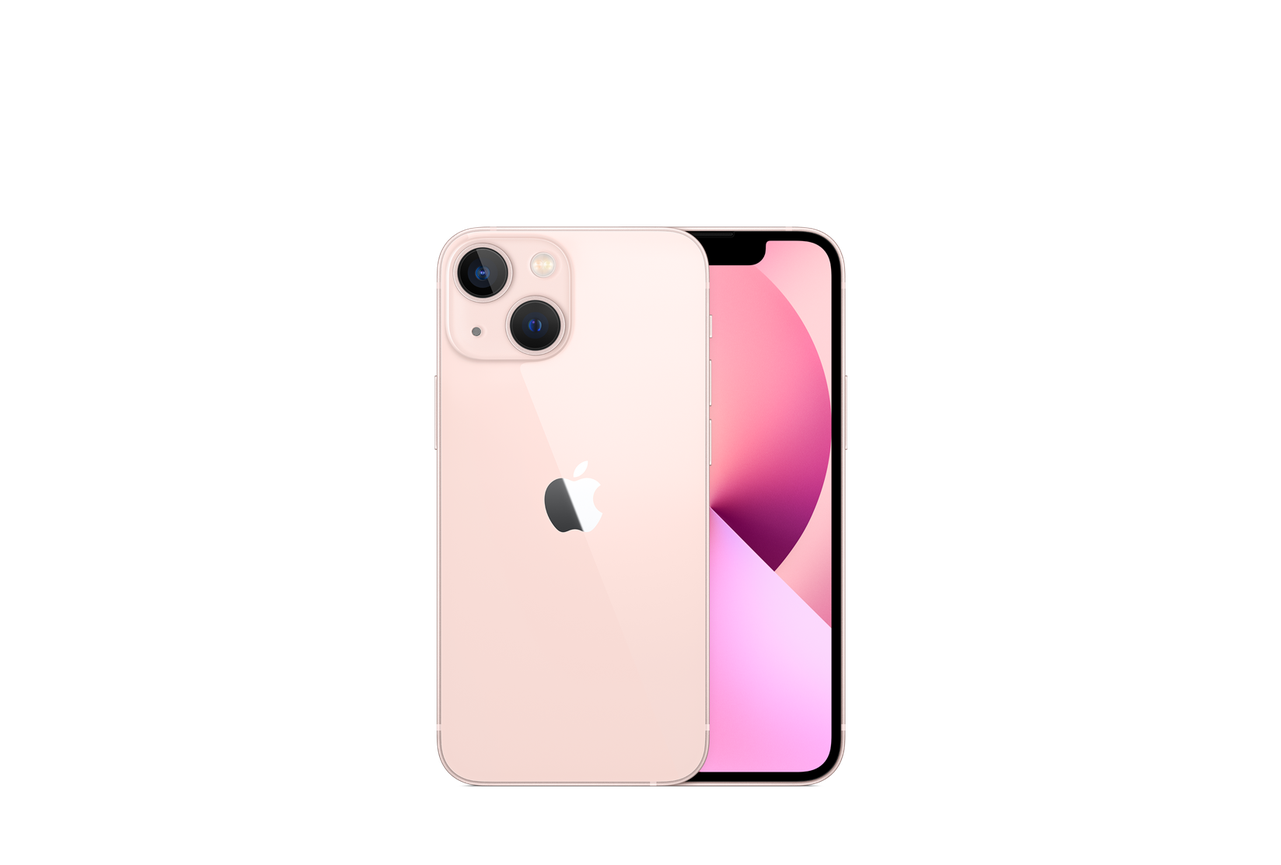
Apple iPhone 13 mini


Use cases & Conditions
Use case scores indicate the product performance in specific situations. They are not included in the overall score calculations.
Outdoor
Photos & videos shot in bright light conditions (≥1000 lux)
Indoor
Photos & videos shot in good lighting conditions (≥100lux)
Lowlight
Photos & videos shot in low lighting conditions (<100 lux)
Friends & Family
Portrait and group photo & videos
 92nd
92nd 17th
17thPros
- Accurate and repeatable target exposure
- Generally nice colors and white balance, pleasant skin tones in most light conditions, even in complex backlit scenes
- Fast, accurate and repeatable autofocus
- Good detail in daylight and under indoor lighting
- Accurate and stable exposure, wide dynamic range in video
- Good texture/noise trade-off in video
- Accurate white balance in video, smooth transition on scene changes
- Mostly accurate and smooth video autofocus
Cons
- Luminance noise on primary and ultra-wide cameras, especially in low light
- Limited dynamic range in challenging high contrast scenes
- Image artifacts, including flare, slight ringing and color quantization
- Limited detail when using medium to long range zoom
- Noise in video, especially in low light
- Lens flare and ghosting in video, especially in low light
- Some loss of texture in video, especially on faces in daylight and indoor conditions
- Sharpness differences between video frames, strong residual motion in videos recorded while running
With a DXOMARK Camera score of 130 the Apple iPhone 13 mini makes it easily into the top ten of our overall ranking and is the clear number one in the Premium segment ranking for devices between $600 and $799. Overall its camera performance is, except for tele zoom, very close to the larger and more expensive iPhone 13 Pro and even better than last year’s top-end iPhone device, the iPhone 12 Pro Max. Given its compact dimensions that makes it the currently best option for mobile photographers who prefer smaller phones.
The Photo score of 138 is outstanding for the class and among the best we have seen overall, thanks to reliable exposure, nice colors and a consistently good autofocus system. Like on previous iPhone we’re still seeing some luminance noise but detail has been improved over previous generations and is good in bright light and under typical indoor conditions.
The lack of a dedicated tele lens means the iPhone 13 mini can’t compete with the very best in the Zoom category but the ultra-wide camera delivers good image quality, resulting in a Zoom score of 55.
At 117 points the iPhone 13 mini scores only two points lower for video than the 13 Pro, making it by far the best video option in the Premium segment and the second best overall (tied with the significantly more expensive Xiaomi Mi 11 Ultra). Video clips recorded with the device show accurate and stable exposure as well as a wide dynamic range. The autofocus works precisely and delivers smooth transitions and the video footage comes with good trade-off between texture and noise. Our testers observed some video artifacts and noise but overall the Apple iPhone 13 mini is an easy recommendation for mobile video shooters.
Photo
The Apple iPhone 13 mini achieves a Photo score of 138. In this section, we take a closer look at each sub-attribute and compare image quality against competitors.

Exposure and Contrast
Apple iPhone 13 mini
101
111
In these tests we analyze target exposure, contrast, and dynamic range, including repeatability across a series of images. Tests are undertaken in a wide range of light conditions, including backlit scenes and low light down to 1 lux. The score is derived from a number of objective measurements in the lab and perceptual analysis of real-life images.
These samples show the Apple iPhone 13 mini’s exposure performance in a high contrast scene compared to competitors.

Color
Apple iPhone 13 mini
104
107
In these tests we analyze color rendering, skin tones, white balance, and color shading, including repeatability across a series of images. The score is derived from a number of objective measurements in the lab and perceptual analysis of real-life images.
These samples show the Apple iPhone 13 mini’s color performance in an outdoor setting compared to competitors.

Autofocus
Apple iPhone 13 mini
105
109
In these tests we analyze autofocus accuracy and shooting time, including repeatability, in the lab. We test focus failures, depth of field, and tracking of moving subjects using perceptual analysis of real-life images.
This graph shows the Apple iPhone 13 mini’s autofocus performance in the lab, at a light level of 300 lux on a tripod.

Texture
Apple iPhone 13 mini
100
111
In these tests we analyze texture on faces and objects, including objects in motion, in a range of light conditions, using several lab test setups and perceptual analysis of real-life images.
Detail is generally high. This graph shows the Apple iPhone 13 mini’s texture performance at different light levels.
These samples show the Apple iPhone 13 mini’s texture performance in outdoor light.

Noise
Apple iPhone 13 mini
69
102
In these tests we analyze noise on faces and objects, including objects in motion, in a range of light conditions, using several lab test setups and perceptual analysis of real-life images.
Luminance noise is visible in most conditions, and especially in low light scenes. These samples show the Apple iPhone 13 mini’s noise performance in low light compared to competitors.
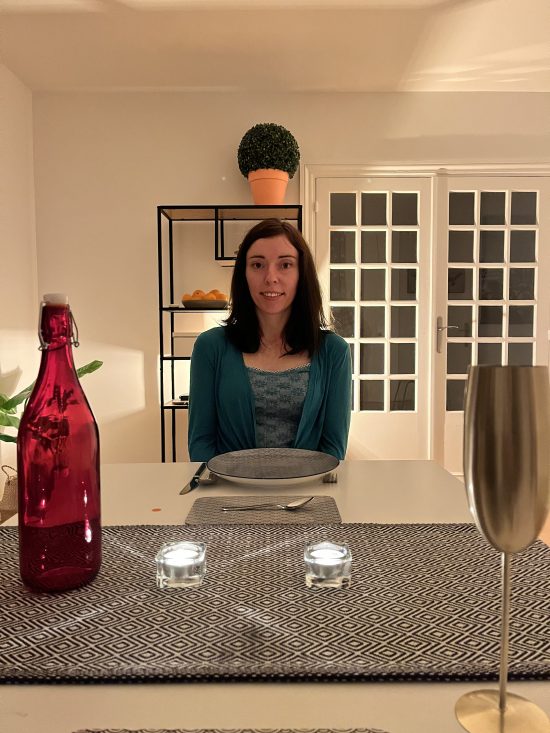
For these tests we switch to the camera’s bokeh or portrait mode and analyze depth estimation, bokeh shape, blur gradient, and repeatability, as well as all other general image quality attributes mentioned above. The score is derived from perceptual analysis of real-life images.
These samples show the Apple iPhone 13 mini’s bokeh simulation indoors. The 13 mini’s use of a short focal length is not optimal here.

Night
Apple iPhone 13 mini
68
82
In these tests we shoot a selection of images in pitch-black darkness as well as with city lights in the background providing some illumination. We shoot sample images with the camera at default settings in both flash-auto and flash-off modes. We analyze all image quality attributes but we pay particular attention to exposure, autofocus, and color. We do not test night modes that have to be activated manually.
These samples show the Apple iPhone 13 mini’s night performance in flash-off mode compared to the iPhone 13 Pro.

Artifacts
Apple iPhone 13 mini
67
77
In these tests we check images for optical artifacts such as vignetting, flare, lens softness in the corner, distortion, and chromatic aberrations, as well as for processing artifacts such as ghosting and fusion errors, hue shift, and ringing.
Artifacts such as flare, ringing, color quantization, ghosting and aliasing are often visible in iPhone 13 mini photos. This sample shows flare in low light.

Preview
Apple iPhone 13 mini
77
80
In these tests we analyze the image quality of the preview image and the differences between preview images and captured images, particularly in terms of exposure, dynamic range, and bokeh effect. We also check the smoothness of the field-of-view changes on the preview image when zooming with both buttons or when using the pinch-zoom gesture.
These samples show how the Apple iPhone 13 mini’s preview accuracy compares to competitors.
Zoom
The Apple iPhone 13 mini achieves a Zoom score of 55. The Zoom score includes the tele and wide sub-scores. In this section, we take a closer look at how these sub-scores were achieved and compare zoom image quality against the competitors.

Wide
Apple iPhone 13 mini
44
58
In these tests we analyze the performance of the ultra-wide camera at several focal lengths from 12 to 20 mm. We look at all image quality attributes, but we pay particular attention to such artifacts as chromatic aberrations, lens softness, and distortion.
These samples show the performance of the Apple iPhone 13 mini’s ultra-wide camera outdoors compared to competitors.

Tele
Apple iPhone 13 mini
63
140
In these tests we analyze all image quality attributes at focal lengths from approximately 40 to 300 mm, paying particular attention to texture and detail. The score is derived from a number of objective measurements in the lab and perceptual analysis of real-life images.
These samples show the Apple iPhone 13 mini’s tele performance at a 50mm equivalent outdoors compared to competitors.
This graph shows the Apple iPhone 13 mini’s texture performance at different light levels.
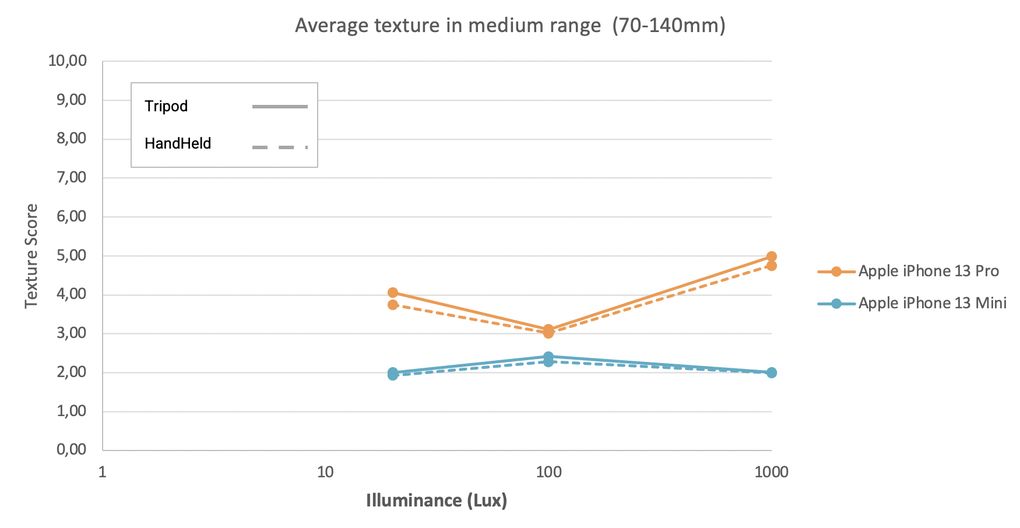
Video
In our Video tests we analyze the same image quality attributes as for still images, such as exposure, color, texture or noise, but we also include such temporal aspects as speed, and smoothness and stability of exposure, white balance and autofocus transitions.
NOTE: The sample video clips in this section are best viewed at 4K resolution.
The Apple iPhone 13 mini achieves a Video score of 117. A device’s overall Video score is derived from its performance and results across a range of attributes in the same way as the Photo score. In this section, we take a closer look at these sub-scores and compare video image quality against competitors.

Exposure and Contrast
Apple iPhone 13 mini
114
118
These sample clips show the Apple iPhone 13 mini’s exposure performance indoors compared to competitors.

Color
Apple iPhone 13 mini
105
107
These sample clips show the Apple iPhone 13 mini’s color performance in low light compared to competitors.
These sample clips show the Apple iPhone 13 mini’s video autofocus performance outdoors compared to competitors.

Texture
Apple iPhone 13 mini
91
99
This graph shows the Apple iPhone 13 mini’s video texture measurements in the lab. The tradeoff between texture and noise is generally well managed in bright to moderate light, though texture rendering artifacts can be visible, especially on faces.

Noise
Apple iPhone 13 mini
100
105
This graph shows the Apple iPhone 13 mini’s video noise measurements in the lab. The tradeoff between texture and noise is generally well managed in bright to moderate light, but noise is very visible in low light.
These sample clips show the Apple iPhone 13 mini’s video noise performance in low light.

Artifacts
Apple iPhone 13 mini
73
85
For video artifacts, we check for the same kinds of artifacts mentioned in the Photo section, along with such video-specific artifacts as frame rate variation in different light conditions, judder effect, and moving artifacts (artifacts such as aliasing, color quantization, and flare can often be more intrusive when moving than in a still image).
Lens flare and ghosting artifacts are often visible in the iPhone 13 mini’s videos when a bright light source is in-frame, especially in low light conditions.

Stabilization
Apple iPhone 13 mini
101
103
In these tests we analyze residual motion when handholding the camera during recording, as well as when walking and running with the camera. We also look for stabilization artifacts such as jello effect, sharpness differences between frames, and frame shift (abrupt changes of framing).
These sample clips show the Apple iPhone 13 mini’s video stabilization in outdoor conditions compared to competitors. Sharpness differences between frames are often visible and strong residual motion is visible when running.


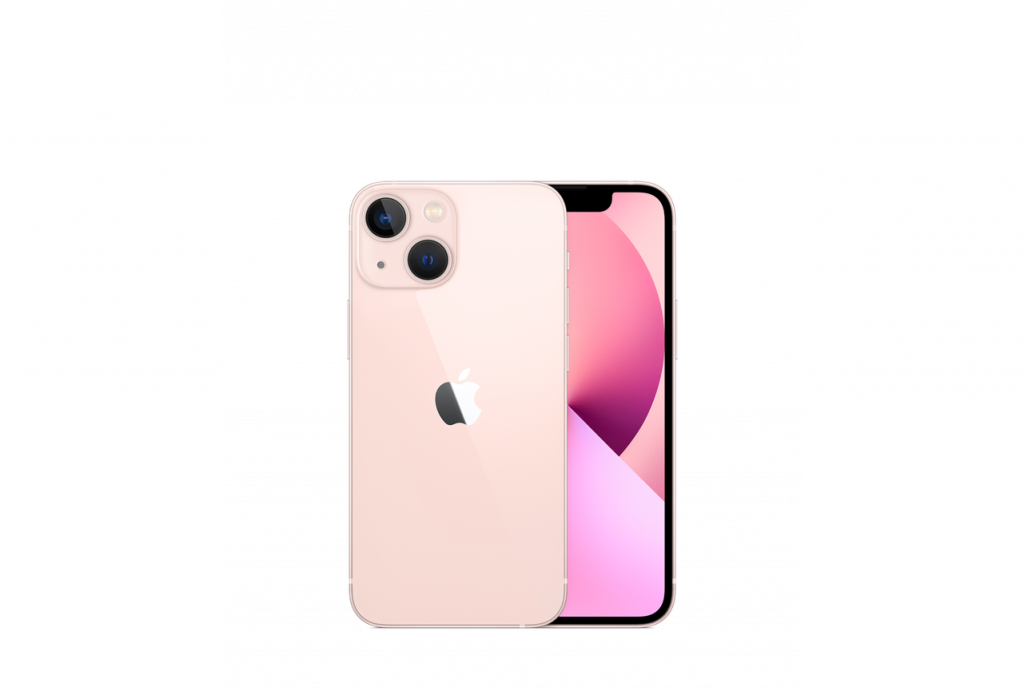
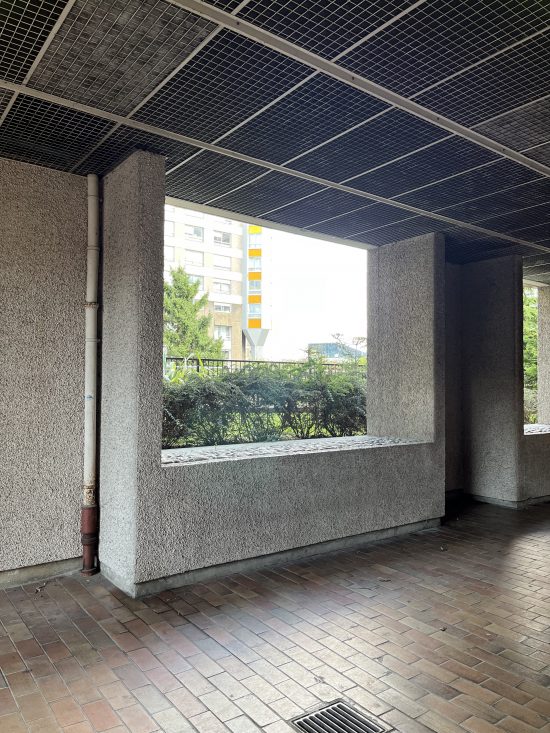
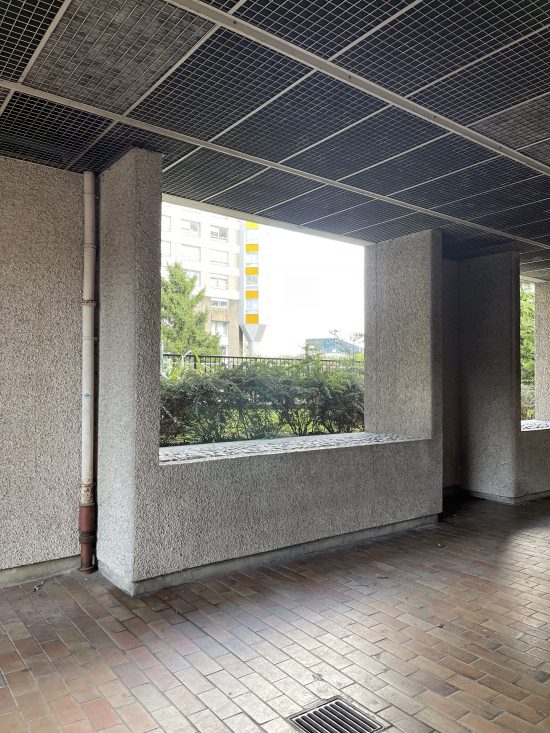
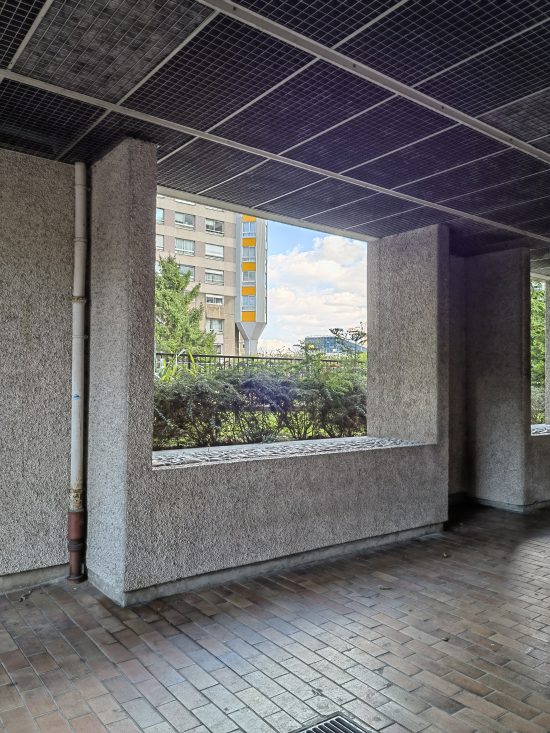



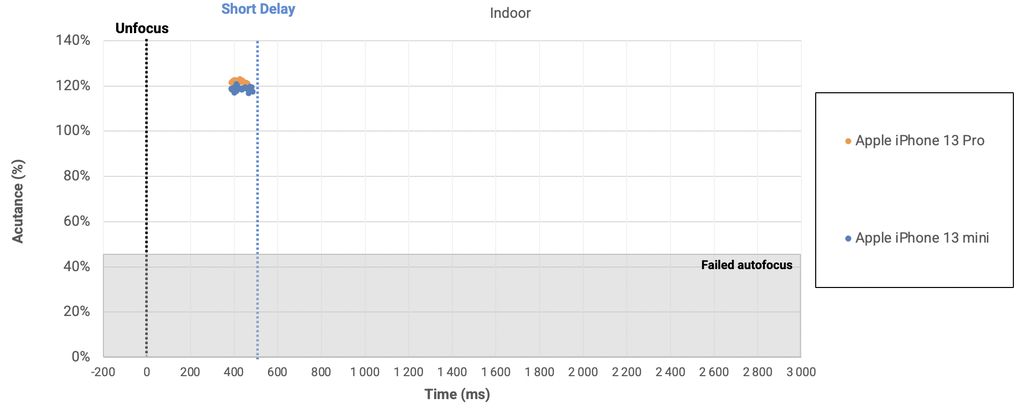
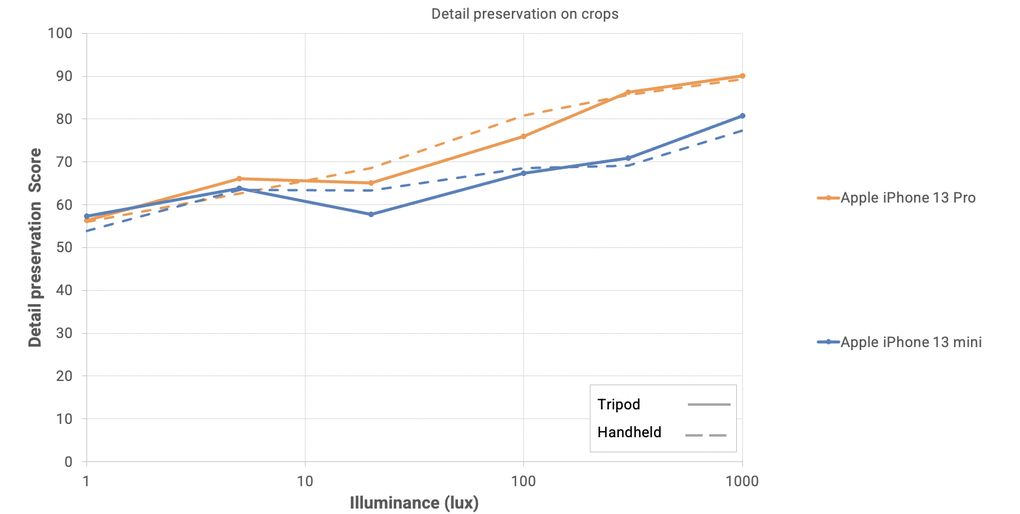



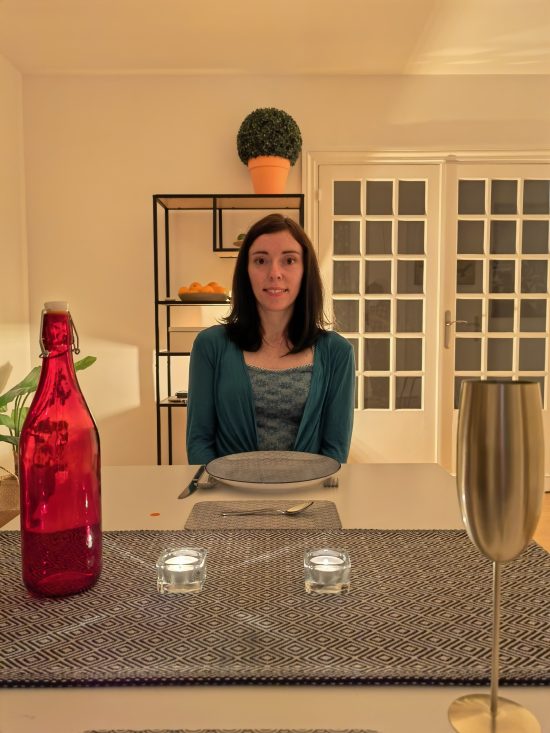
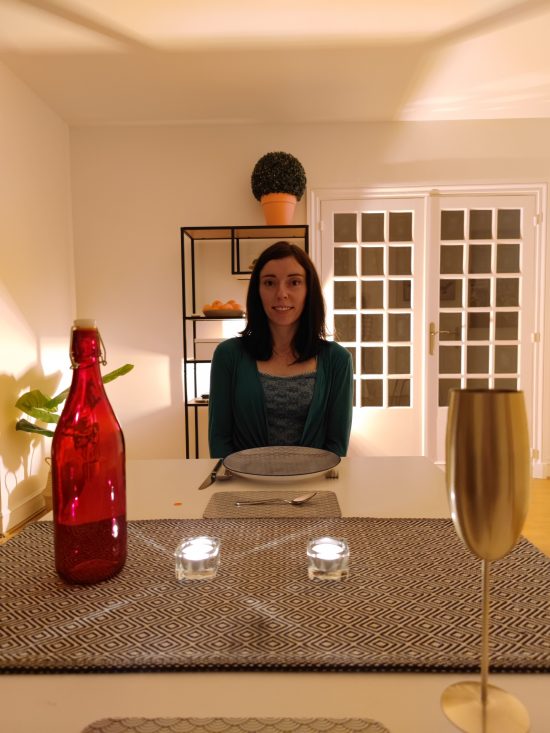






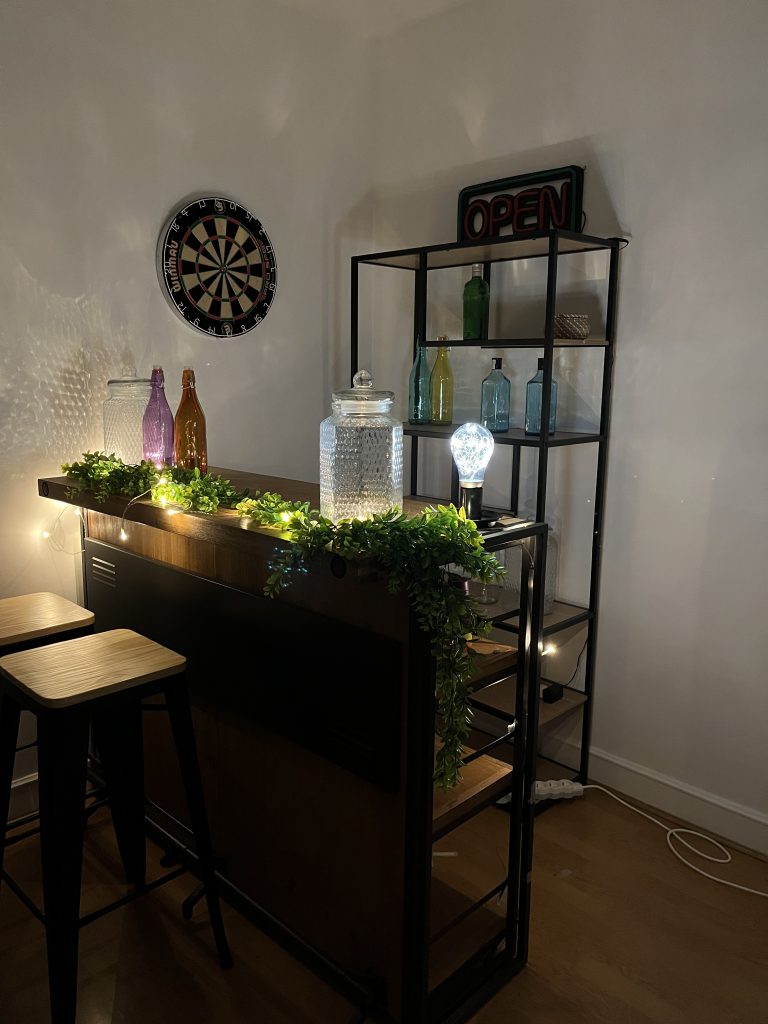
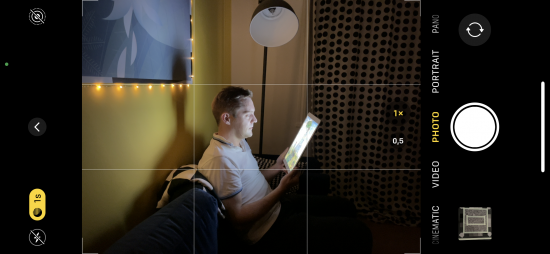
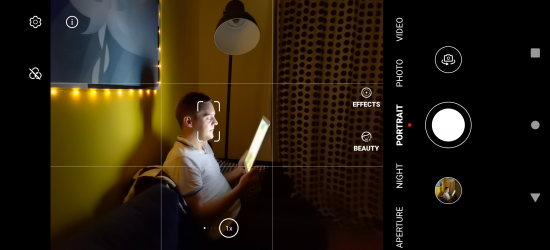
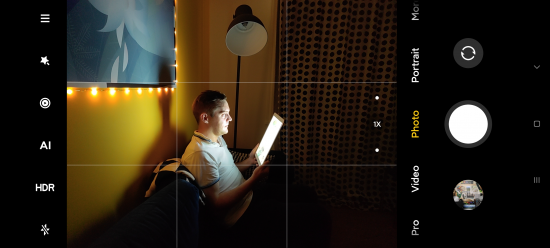
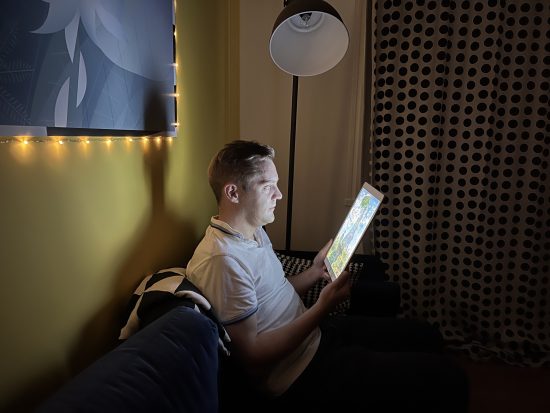
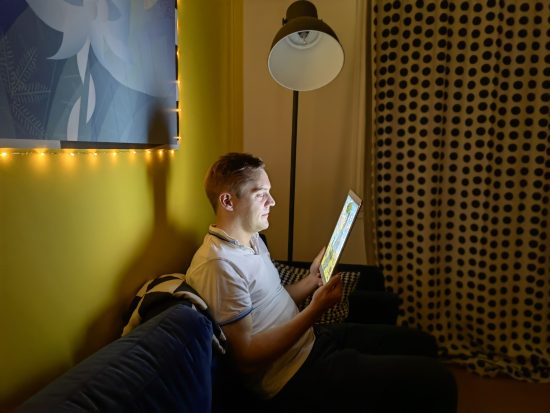
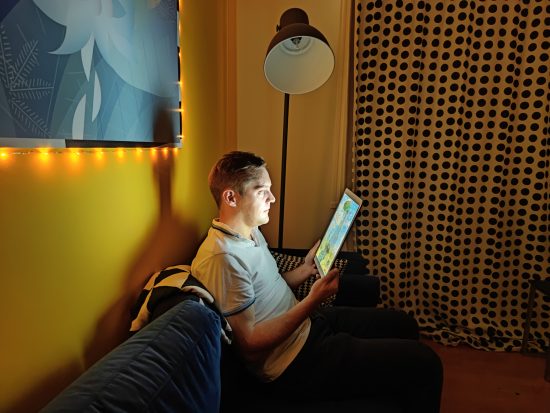
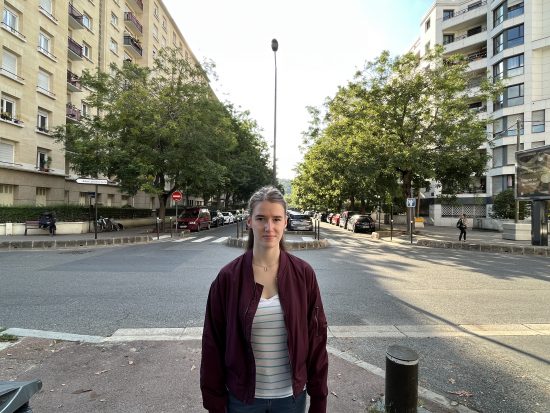
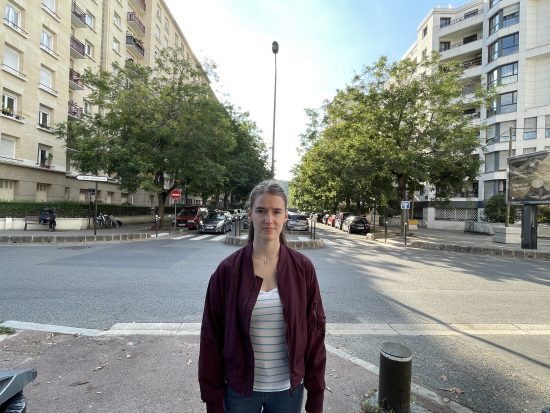
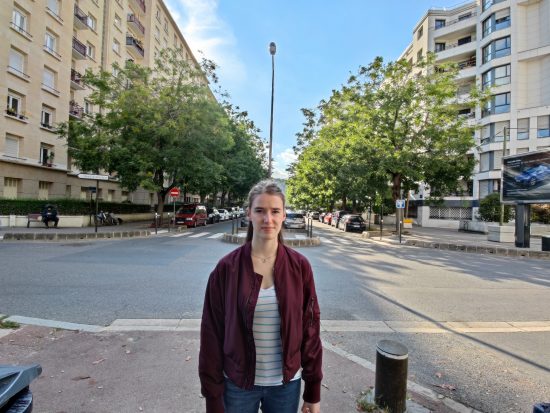
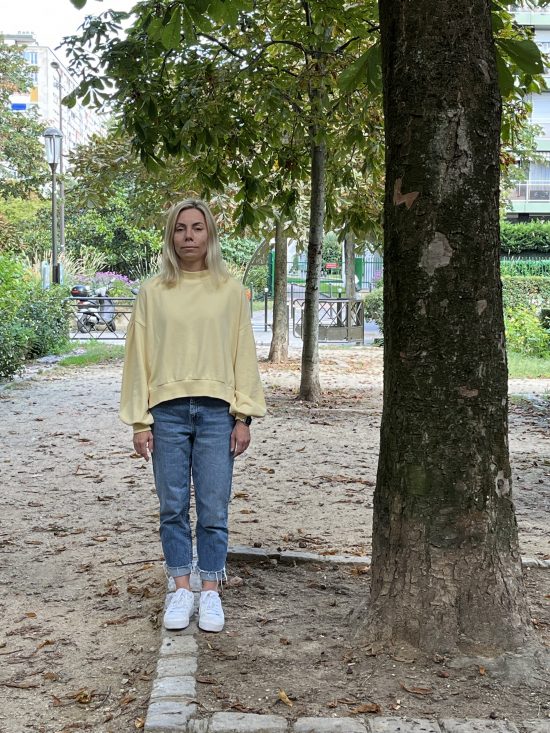
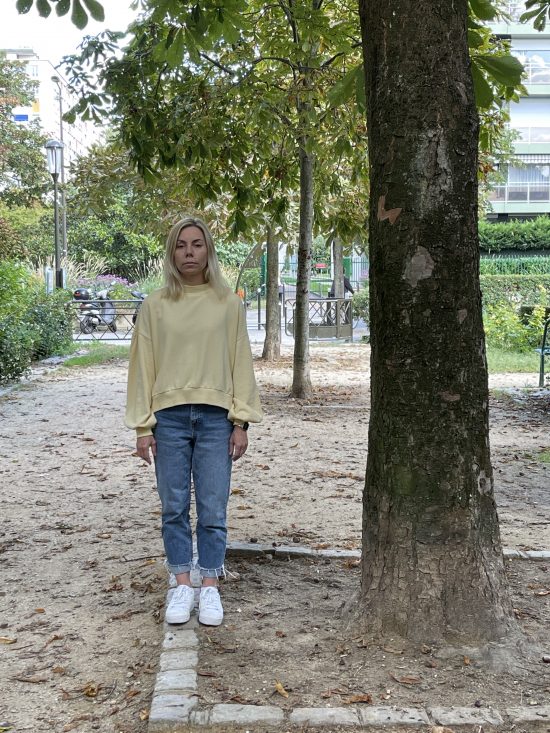
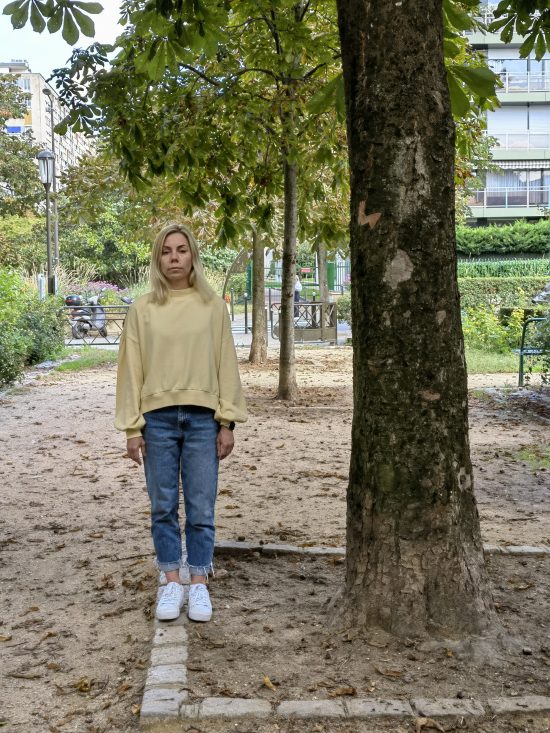
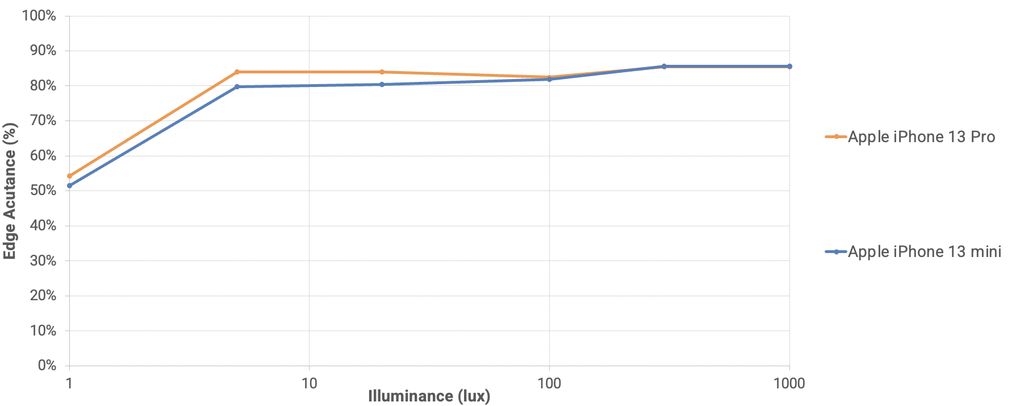
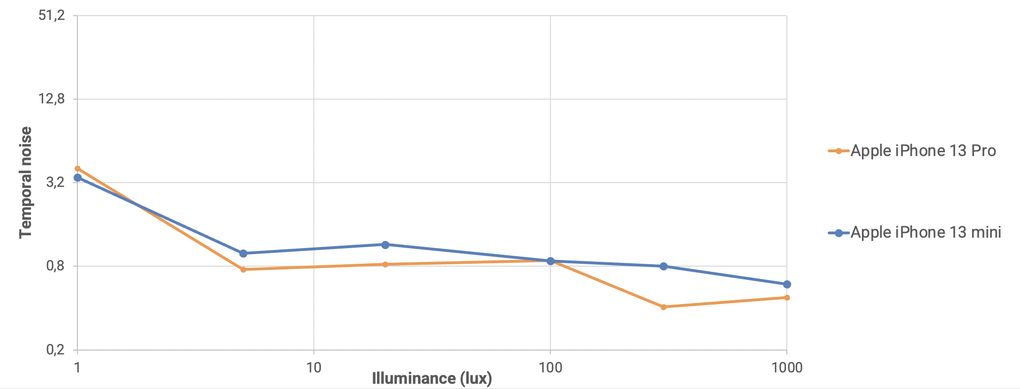
DXOMARK encourages its readers to share comments on the articles. To read or post comments, Disqus cookies are required. Change your Cookies Preferences and read more about our Comment Policy.